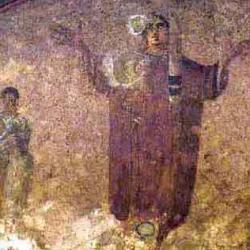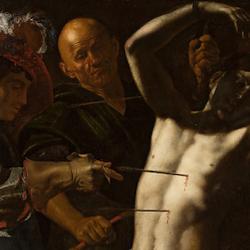In his Political Worship, Bernd Wannenwetsch observes that “Worship again and again interrupts the course of the world. Through worship the Christian community testifies that the world is not its own. And this means also that it is not kept alive by politics, as the business of politics, which knows no sabbath, would have us believe. That is why the celebration of worship is not directed simply against this or that totalitarian regime; it is directed against the totalization of political existence in general” (127).
The church’s worship negates the totalizing political inclinations of the world, but Christian worship also has a positive contribution to make to political life. Wannenwetsch writes that “the form of this interruption is itself political: the shared action that enters assentingly into the great acts of God. The power of the Church is to be found in this assent.” Demythologizing political life had its effect on “the representatives of political power,” so that the emperor himself could be “called to do penance like any normal believer for ‘crimes committed’—it was actually said—‘in the name of the state’” (130).
Remarkably, miraculously, emperors complied: “The emperor did penance before God to whom all Christians bow the knee. This was not an act of political subservience it was a penitential worship ritual. . . . in worship the emperor had no higher rank than that of a subdeacon,” in both East and West. Worship had introduced a “completely new feature,” the “potential duty of Christians to resist public authority, a duty which was bound to be awakened by worship. Christians had to refuse their assent to the Roman state cult, because it was incompatible with the political dimension of their own worship. This would have been inconceivable for the political theory of the ancient world” (131).
Wannenwetsch sees this coming to a specific focus in attitudes toward the body:
The totalization of political life in the ancient world had expressed itself particularly as a total claim to the body of the human being. ‘The classical, pre-Christian view, then, is that the city-state should have complete control of human bodies for the purpose of labor, procreation and war’ [quoting Jean Bethke Elshtain in Modern Theology 9 (1993) 110]. This purely functional view and treatment of bodily life underlies the categorical supremacy of the political over the private sphere, and simultaneously intensifies its effect. Against this background, the view of the human body as “the temple of the Holy Spirit” . . . was bound to act politically like gunpowder. (132)
When “the claim of the state to the body of Christians collided with the claim of the spirit of Christ,” the result was martyrdom: “the political claim could be enforced only by violence—through the killing of the body.” That clash over the body revealed that the political claim to the body was “a claim ‘to the death.’” Yet that claim couldn’t ultimately win out, since “the power of the Spirit is still efficacious even in the dead, in the resurrection of those killed and—sanguis semen ecclesiae—in the building up of the Body of Christ, as a community of bodies set free” (132-3). The bodies of Christian martyrs, claimed by the Spirit in baptism and Eucharist, subverted the power of the Roman state.












